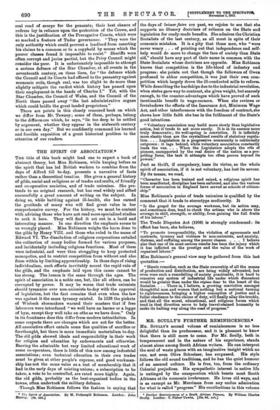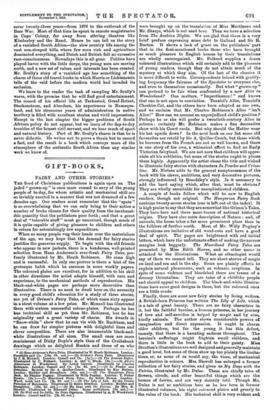MR. SCULLY'S FURTHER REMINISCENCES.* Mn. SCULLY'S second volume of reminiscences
is no leas delightful than its predecessor, and it is pleasant to know that there is still more to come. For Mr. Scully, both in temperament and in the nature of his experience, stands almost alone among South African writers. He can interpret the soul of waste places with an imaginative insight which no one, not even Olive Schreiner, has surpassed. His style follows the old sound traditions, and he has the quiet humour of an assured culture. He is free, too, from the ordinary Colonial prejudices. His sympathetic interest in native life is untinged by the exasperation which besets most South Africans at its economic irrelevance. He loves old ways, and is as exempt as Mr. Merriman from any undue admiration for what is called "progress." His recollections in this volume • Further Reminiscences of a South African Pioneer, By William Charles Scully. London : T. Fisher Unwin. 110s. 6d. net.]
cover twenty-three years—from 1876 to the outbreak of the Boer War. Most of that time he spent in remote magistracies in Cape Colony, far away from stirring theatres like Kimberley and the Rand. Hence he can tell us the story of a vanished South Africa—the slow country life among the vast sun-steeped hills, where few were rich and agriculture dominated everything, and Dutch and British felt no excessive race-consciousness. Nowadays this is all gone. Politics have played havoc with the little dorps, the young men are moving north, and a new set of values and interests has been created. Mr. Scully's story of a vanished age has something of the charm of those old travel-books in which Harris or Lichtenstein tells of the veld before the modern world had invaded its seclusion.
We leave to the reader the task of sampling Mr. Scully's wares, with the promise that he will find good entertainment. The record of his official life at Tarkastad, Graaf-Reinet, Stockenstrom, and Aberdeen, his experiences in Namaqua- land, and his strenuous years of administration in native territory is filled with excellent stories and vivid impressions. Except in the last chapter the bigger problems of South African policy do not appear, but we learn of the day-to-day troubles of the honest civil servant, and we hear much of sport and natural history. Part of Mr. Scully's charm is that he is never didactic. He writes not to prove a thesis but to record a fact, and the result is a book which conveys more of the atmosphere of the authentic South Africa than any similar work we know of.































































 Previous page
Previous page